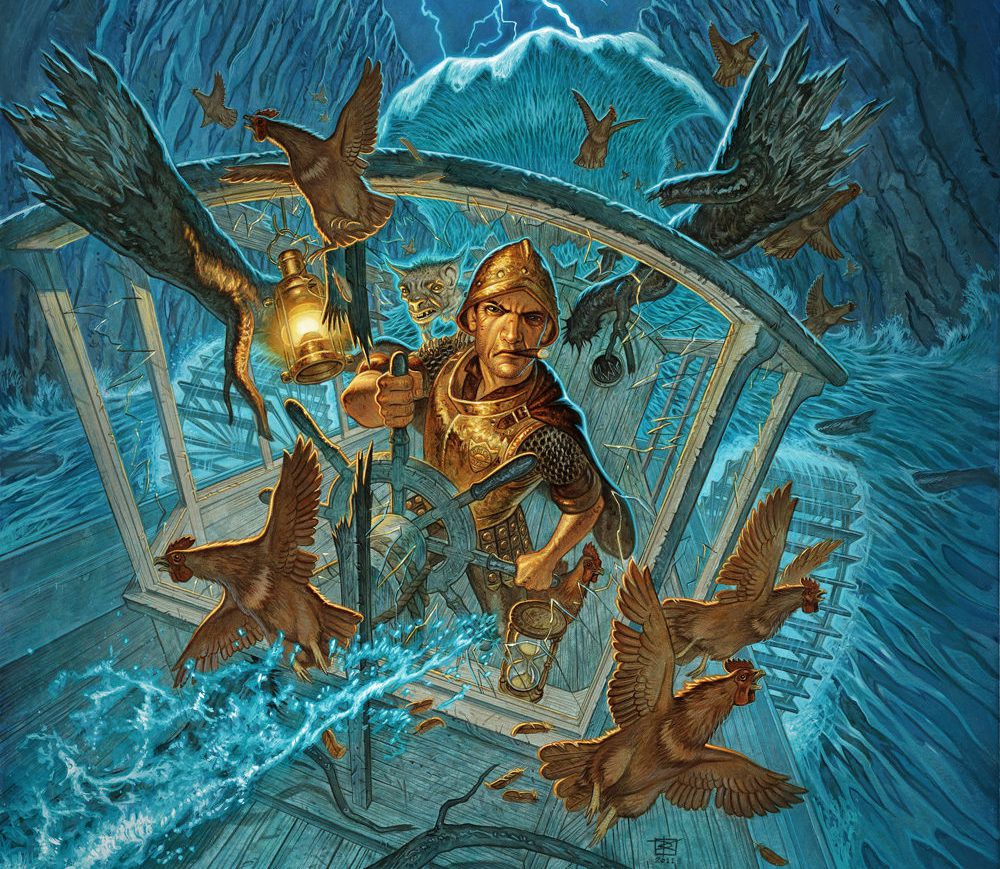Whether you’re a longtime fan of bestselling, beloved British fantasy writer Terry Pratchett, or you heard about him for the first time when Good Omens, his collaborative project with Neil Gaiman, got its long-awaited TV adaptation, Humble’s deal on Pratchett’s Discworld novels is a convenient way to get most of his books in one place. The bundle includes 38 fantasy novels from Pratchett’s Discworld setting, for as low as $18. To access the books, you’ll need to create a Kobo.com account, or log in to your existing account.
Pratchett started writing Discworld books — set in a fantasy world that rides through space on the back of a giant turtle — back in the 1980s, and continued up until his death in 2015. They were predictable bestsellers: The BBC estimates his lifetime sales at more than 100 million copies. Longtime fans got to watch the series evolve over decades from the light, goofy, satiric fantasy of his first novel — 1983’s The Colour of Magic — to much more sophisticated novels about duty, power, responsibility, and the evolution of society, though he never lost his knack for wry, clever, unexpectedly hilarious turns of phrase.
The deal happening at Humble includes almost all the Discworld novels, apart from the last two — 2013’s Raising Steam and 2015’s The Shepherd’s Crown aren’t included — and the short illustrated novel The Last Hero. But 38 books at once is a pretty overwhelming addition to anyone’s library. Once you’ve downloaded them all, what next?
Where to start reading Terry Pratchett’s Discworld
Longtime Discworld fans have a lot of very strong opinions about the proper reading order for the Discworld books, and particularly about where to enter the series. That’s because the series as a whole contains many different sub-series, each of which follow a specific set of characters in a setting within the world, and sees them evolve over time. Different fans have different favorites. It isn’t particularly necessary to read the books in chronological order of publishing — and if you try, you aren’t likely to get the best view of Pratchett’s work with this series, since the earliest books are much sillier and more superficial than the later ones.
But it’s generally better to check a guide to those sub-series and read books within a set in order. Unlike most long fantasy series, none of Discworld is organized into trilogies or other sets that have to be read in order. Each one has its own start-to-finish plot, and few of them really rely on continuity. So you really can pick one nearly any Discworld book at random without missing more than some basic setup context.
All that said, my personal recommendation for people approaching Discworld for the first time is 2003’s Monstrous Regiment, the rare Discworld book that isn’t really part of any sub-series. While it features a few established characters in minor roles, the central characters and their dilemma are all new to this book, so it’s an easy jump-in point to the later series, and to Pratchett’s more developed narrative voice. It also deals with a comparatively remote and sheltered part of the Discworld, so you don’t need to know much going in.
Monstrous Regiment follows Polly Perks, a newly established soldier in the army of the benighted nation of Borogravia, as she disguises herself as a man and goes to war, Mulan-style. Like Mulan, Polly is trying to protect a family member — in this case, her missing soldier brother, who she’s seeking by heading into combat with Borogravia’s bordering nation, Zlobenia. Stuck in a society that oppresses and devalues women, and that’s controlled by an increasingly erratic deity that’s declared everything from cats to garlic to the color blue as anathema, Polly has to pretend to be male to get by. But in a series of comic reveals, it turns out that her fellow soldiers are harboring secrets of their own. Those secrets emerge one by one in a story that’s part satire of the “disguised as a boy” trope, part knowing deconstruction of repressive societies, and part going-to-war adventure.
It’s a breezy, snappy, enjoyable read, but it also illustrates how well Pratchett balanced serious character arcs and fantasy plotting with insights about humanity, and with quintessentially British dry humor. And it’ll give you a side introduction to Samuel Vimes, one of Pratchett’s all-time favorite Discworld characters, and the core of one of those sub-series. If you like Monstrous Regiment and you’re ready for more, try Guards! Guards!, the first of the Vimes-centered City Watch books — and consider yourself well on the way toward becoming yet another Pratchett fanatic, and well on your way to getting your $18 worth out of this Discworld bundle.

